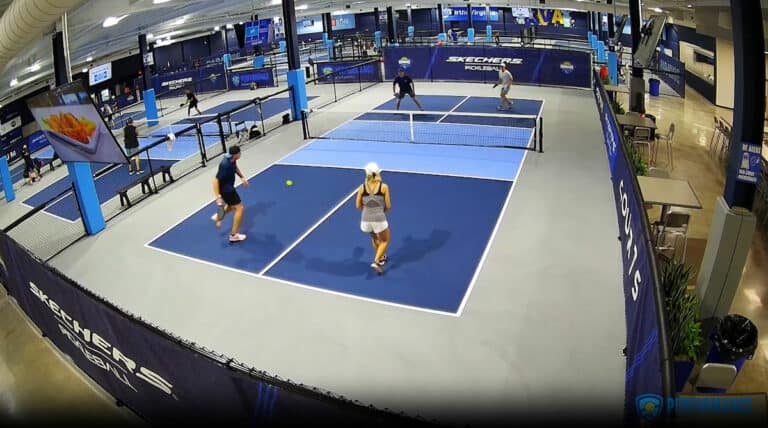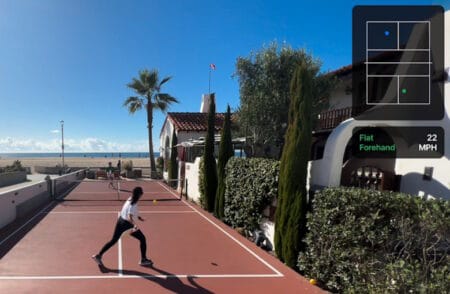Autonomous table tennis venue operator PingPod is now serving up its technology for pickleball, offering operators the ability to book and provide games with little to no on-site employee interaction. The mix of hardware and software could make it possible for pickleball facilities to increase hours of play to off-peak hours with reduced overhead.
New York-based CityPickle, Picklemall in Tempe, Arizona, SPF Chicago, Performance Pickleball RVA in Richmond, Virginia, and Fairfax’s Down The Line Sports Center are among the pickleball operators licensing PodPlay, the technology subsidiary from PingPod.
PodPlay is offered in three tiers. Tier 1 is software-only, providing access to a white-labeled venue management web and mobile app to handle court reservations and payments.
Tier 2 (also called Pro Tier) includes cameras and iPads placed inside venues to provide pickleball players with video replays of their best moments, as well as a courtside scoreboard feature. CityPickle currently uses the software-only tier, while Picklemall uses Tier 2.
Tier 3 the autonomous tier, which includes access to PodPlay’s remote 24/7 security monitoring team that enables operators to follow the model of PingPod, which has zero on-site employees at its 18 table tennis locations across the U.S. and U.K.
No pickleball operators have yet signed up for the autonomous tier, but PingPod co-founder David Silberman says clients are showing interest in becoming “semi-autonomous.”
“Many of our current clients and clients in the pipeline have expressed interest in progressing to the Autonomous tier once they have gotten comfortable on the pro-tier,” Silberman told NoVolleys. “Pickleball operators have expressed interest in becoming “semi-autonomous,” that is, fully autonomous in the early morning and late evening and running labor-light during the day.”
How Do The Autonomous Venues Work?
PindPod operates 18 autonomous table tennis venues across New York City, New Jersey, Philadelphia, Boston, Chicago, Miami, and England. Its first venue opened on the Lower East Side of Manhattan in February 2020, and it now has nine locations in New York City.
There are no employees at PingPod locations. Guests make reservations to play on PingPod’s mobile app or website. Upon arriving at a PingPod location, they scan their phone to unlock the door and access their “pod”—a room with a ping pong table to play with their friends or other guests. A table costs between $15 and $50 an hour depending on the time of day.
With reduced labor costs, Silberman says that autonomous pickleball venues could offer extended hours of operations.
“Rather than opening at 8am. maybe they could open at 6am., and rather than closing at 9pm, they could perhaps stay open until midnight or 1am,” Silberman says. “And we would be able to take care of their security monitoring and court regulation during those periods.
PingPod’s co-founders include former No. 1 ranked U.S. table tennis player Ernesto Ebuen. The startup raised $10 million in venture capital funding in 2022 and then acquired autonomous pool/billiards club Sharks in 2023.
PingPod’s security intercom system has been used to voice down to customers acting out of line, but so far in five years there have been no safety issues.
“We are fortunate and thankful to report that there has never been a meaningful incident involving a customer,” Silberman says. “I actually would make the strong case that we are safer than your average physical operation, whether it be a restaurant, a deli, clothing store, whatever. Anyone can just walk into any establishment in New York City. We are one of the only places where the doors are locked. You can’t open the door unless you have a reservation.”
Arizona’s Picklemall Monetizes Video Replays With PodPlay
Picklemall opened its first indoor pickleball facility in Tempe, AZ, last summer and plans to open locations in 50 U.S. malls by mid-2025. The company is backed by billionaire Major League Pickleball founder Steve Kuhn.
In addition to running on PodPlay’s court reservation system, Picklemall’s membership tiers also include video replays from PodPlay. Depending on their tier, members can access 5, 25, or 50 video replays per month and pay 50 cents for each additional replay.
“Every video is watermarked with the brand’s logo. And those videos end up getting shared amongst friends and family and they get uploaded to social media so they end up bouncing all around the internet,” Silberman says.
PingPod has 128,000 followers on Instagram and processes nearly 10,000 video replays per month.
The company generates between 10 million and 20 million social media impressions per month, and its social media team compiles the top-10 video replay highlights on a monthly basis to display on monitor screens inside its venues.
PingPod has more than 75,000 customer accounts and is approaching 10,000 total reservations per month for its table tennis venues.
“The PodPlay software business is growing faster than the PingPod business. So it’s just a matter of time before it kind of overtakes the PingPod business,” Silberman said. “It is quickly becoming our primary business just because of the scale and growth potential of the PodPlay business versus a brick and mortar concept. So that is the deep connection we have to pickleball.”


